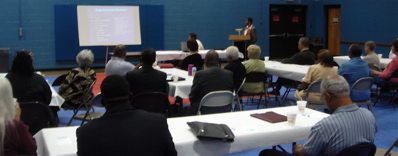
Home ●
Where We Meet ●
News ●
Announcements ●
Events ●
About Us ●
Contact Us ●
Search ●
Morning
Breakfast
Forum
Charlotte, NC
www.tueforumclt.org
Sept. 23, 2007
Planning director: Community's growth framework designed to maintain choices of urban, suburban living
Charlotte-Mecklenburg Planning Director Debra Campbell on Tuesday, Sept. 18, explained the community's "growth framework" based on dense centers of development, corridors connecting those centers, and "wedges" of lower density elsewhere.
The accompanying transportation plan, she said, "isn't transit OR. It is transit AND" -- transit and roads, and bikeways and sidewalks so that, again, we address, from a multi-modal perspective, all of the transportation needs and demands.
 The
key question, she said, is: "How do we organize development so people still
have a choice to live on the half-acre lot, but they also can choose a much
more urban environment, which we know people are desiring.
The
key question, she said, is: "How do we organize development so people still
have a choice to live on the half-acre lot, but they also can choose a much
more urban environment, which we know people are desiring.
"With transit we get to have a multitude of lifestyles."
Invited to the Forum as part of an exploration of the transit tax referendum on the November ballot, Campbell noted that as a government employee she was "not permitted to advocate one way or the other on the bonds.... I will let you... make the intellectual connection between the need for the bonds and the information I will present."
Much of Campbell's talk at the Sept. 18 Forum focused on the mission of the planning department, which began as a joint city-county function in 1954, and the city's growth in the years since. She displayed for the audience maps showing neighborhoods where the most recent neighborhood improvement bonds had been spent, and another map showing all neighborhoods affected since 1990.
Among the statistics she offered: The city of the 1950s had nearly 7 people per acre. The city of 2000 had only 3.8 people per acre.
One of Charlotte's key advantages over nearby cities, she said, is jobs. "The edge that we have in Charlotte is employment."
A questioner suggested that public policy was deliberately dividing the community by race and socioeconomics. Campbell replied that in fact "the majority of our policies... are about infill development" that would mix housing types.
Campbell was asked what the roadblocks were to preventing new housing where no school facilities are available. Campbell noted that most land may be developed in some residential way with no approvals beyond a building permit. Negotiations have led developers to donate money toward school sites. Some communities have approved an adequate public facilities ordinance that requires that public facilities be in place before large-scale residential development takes place. Huntersville is preparing to debate that issue now, she said. Other communities have used impact fees. Mecklenburg's studies on this issue, she said, go back to the 1980s. "We need to do something and we need to do it fast," she said. "It's the 'what' that is the debate."
Asked if it would help prompt developer cooperation in infrastructure development if the default residential zoning were two units per acre, down from the current three units per acre, Campbell said it would help. But lowering the zoning, she said, would require resources because lowering the zoning density would be considered a taking under state law.
"There are lots of ways to skin the cat. The issue, I think, is when are we really going to get serious about this issue? We've been talking for two decades. It is truly time for somebody to stand up and say, 'we're going to do something by 2009', rather than 'we need to do something.' "
Campbell was asked how Mecklenburg could put housing at all price points closer to job sites. Campbell said there was strong resistance to housing that did not increase the property values of existing residences. She said inclusionary zoning could be passed that required developers to set aside some units in any development for affordable housing.
Asked how the community could get inclusionary zoning, Campbell said, "I think it will take the political will of our elected officials to, No. 1, demand that staff bring back a proposal related to inclusionary zoning and then 2, have the votes" to approve it.
In answer to another question, Campbell said inner-city Charlotte was attracting "exciting" residential development, but she was approaching the trend with caution "because of the issue of gentrification -- there is a real displacement issue with what is happening.... It will take money... more affordable housing units that the city can control and put restrictions on how long they can stay affordable."
Campbell's appearance was preceded by an 8 a.m. presentation by the Vote Yes
Committee, supporters of bonds on the November ballot. The presentation,
including a short speech by co-chair Eulada Watt, was one of six made by the
committee across the county that day.
--------------------------------------------------------------------------------------------
The Forum welcomes all persons to its meetings
beginning at 8 a.m. most Tuesdays of the year
at the West Charlotte Recreation Center, 2222 Kendall Drive, Charlotte, NC
down the hill from West Charlotte High School.